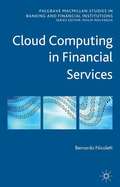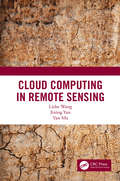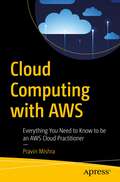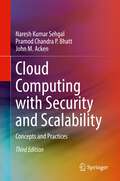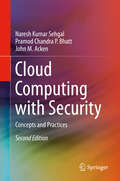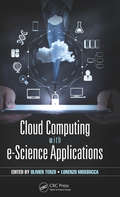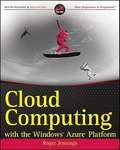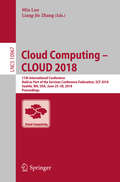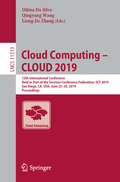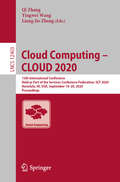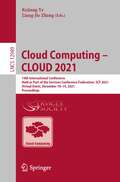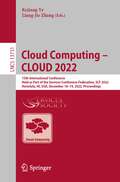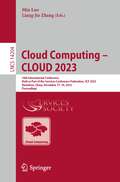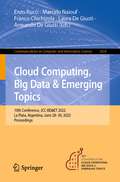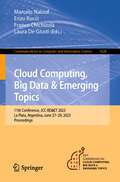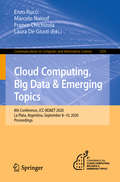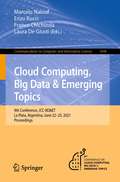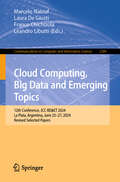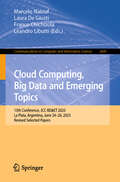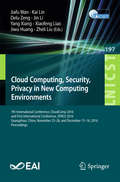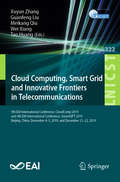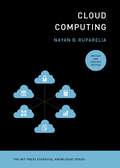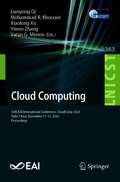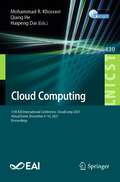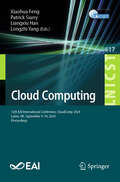- Table View
- List View
Cloud Computing in Financial Services
by Bernardo NicolettiFinancial institutions must become more innovative in the conduct of their business. Cloud computing helps to achieve several objectives: innovative services, re-engineered processes, business agility and value optimization. Research, consultancy practice and case studies in this book consider the opportunities and risks with vendor relationships.
Cloud Computing in Remote Sensing
by Lizhe Wang Yan Ma Jining YanThis book provides the users with quick and easy data acquisition, processing, storage and product generation services. It describes the entire life cycle of remote sensing data and builds an entire high performance remote sensing data processing system framework. It also develops a series of remote sensing data management and processing standards. Features: Covers remote sensing cloud computing Covers remote sensing data integration across distributed data centers Covers cloud storage based remote sensing data share service Covers high performance remote sensing data processing Covers distributed remote sensing products analysis
Cloud Computing with AWS: Everything You Need to Know to be an AWS Cloud Practitioner
by Pravin MishraEmbark on a ground-up journey to cloud computing and the Amazon Web Services (AWS) eco-system, including all the other systems, services, and the security associated with it. This book provides you with the practical know-how to become an AWS Cloud practitioner.Your exploration will take you from key fundamentals of identity and access, storage, networking, architectures, databases, security and compute services all the way through to more advanced topics. The book is organized into easy-to-follow and engaging chapters with simple examples to make complex concepts very easy to understand followed by simple step-by-step demonstrations and case studies to make you proficient in every area of AWS. You'll manage databases in your on-prem data centers and set up, operate, and scale relational database in the cloud. All the services and resources taught in this book come from the AWS Free Tier, so you will not have to pay anything to use and learn from this book. What You'll Learn Understand key concepts and benefits of cloud computingEmploy key cloud computing models and services Review the concept of virtual machines in a cloud computing contextStudy compute services that meet your requirementsWho This Book Is ForIT professionals looking to change their domain to cloud computing as well as those who are looking to utilize AWS for their systems and projects.
Cloud Computing with Security and Scalability.: Concepts and Practices
by Naresh Kumar Sehgal Pramod Chandra Bhatt John M. AckenThis book provides readers with an overview of Cloud Computing, starting with historical background on mainframe computers and early networking protocols, leading to current concerns such as hardware and systems security, performance, emerging areas of IoT, Edge Computing, and healthcare etc. Readers will benefit from the in-depth discussion of cloud computing usage and the underlying architectures. The authors explain carefully the “why’s and how’s” of Cloud Computing, so engineers will find this book an invaluable source of information to the topic. This third edition includes new material on Cloud Computing Scalability, as well as best practices for using dynamic cloud infrastructure, and cloud operations management with cost optimizations. Several new examples and analysis of cloud security have been added, including ARM architecture and https protocol.Provides practical guidance for software developers engaged in migrating in-house applications to Public Cloud;Describes for IT managers how to improve their Cloud Computing infrastructures;Includes coverage of security concerns with Cloud operating models;Uses several case studies to illustrate the “why’s and how’s” of using the Cloud;Examples and options to improve Cloud Computing Scalability.
Cloud Computing with Security: Concepts and Practices
by Naresh Kumar Sehgal Pramod Chandra Bhatt John M. AckenThis book provides readers with an overview of Cloud Computing, starting with historical background on mainframe computers and early networking protocols, leading to current concerns such as hardware and systems security, performance, emerging areas of IoT, Edge Computing etc. Readers will benefit from the in-depth discussion of cloud computing usage and the underlying architectures. The authors explain carefully the “why’s and how’s” of Cloud Computing, so engineers will find this book an invaluable source of information to the topic. This second edition includes new material on Cloud Computing Security, Threat Vectors and Trust Models, as well as best practices for a using dynamic cloud infrastructure, and cloud operations management. Several new examples and analysis of cloud security have been added, including edge computing with IoT devices.
Cloud Computing with e-Science Applications
by Olivier Terzo Lorenzo MossuccaThe amount of data in everyday life has been exploding. This data increase has been especially significant in scientific fields, where substantial amounts of data must be captured, communicated, aggregated, stored, and analyzed. Cloud Computing with e-Science Applications explains how cloud computing can improve data management in data-heavy fields such as bioinformatics, earth science, and computer science. The book begins with an overview of cloud models supplied by the National Institute of Standards and Technology (NIST), and then: Discusses the challenges imposed by big data on scientific data infrastructures, including security and trust issues Covers vulnerabilities such as data theft or loss, privacy concerns, infected applications, threats in virtualization, and cross-virtual machine attack Describes the implementation of workflows in clouds, proposing an architecture composed of two layers—platform and application Details infrastructure-as-a-service (IaaS), platform-as-a-service (PaaS), and software-as-a-service (SaaS) solutions based on public, private, and hybrid cloud computing models Demonstrates how cloud computing aids in resource control, vertical and horizontal scalability, interoperability, and adaptive scheduling Featuring significant contributions from research centers, universities, and industries worldwide, Cloud Computing with e-Science Applications presents innovative cloud migration methodologies applicable to a variety of fields where large data sets are produced. The book provides the scientific community with an essential reference for moving applications to the cloud.
Cloud Computing with the Windows Azure Platform
by Roger JenningsLeverage the power of the Azure Services Platform for cloud computingWith the Azure Services Platform, processing and storing data moves from individual corporate servers and Web sites to larger, more reliable, and more secure data centers. Roger Jennings, author of more than 30 books on Microsoft technologies, shows you how to leverage the power of Azure and its related services for cloud computing.The book begins with a look at the differences between cloud computing and application hosting and examines the various issues that .NET developers and IT managers face in moving from on-premise to cloud-based applications, including security, privacy, regulatory compliance, backup and recovery, asset cataloging, and other common technical issues. The author then drills down, showing basic programming for individual Azure components, including storage, SQL Data Services, and .NET Services. He then moves on to cover more advanced programming challenges.Explains the benefits of using the Azure Services Platform for cloud computingShows how to program with Windows Azure components, including Azure Table and Blob storage, .NET Services and SQL AzureAddresses advanced programming challenges of creating useful projects that combine cloud storage with Web applications or servicesCompanion Web site features complete, finished applications that can be uploaded to jump start a Windows Azure projectRoger Jennings clears away the clouds and gets you started using the Azure Services Platform.
Cloud Computing – CLOUD 2018: 11th International Conference, Held as Part of the Services Conference Federation, SCF 2018, Seattle, WA, USA, June 25–30, 2018, Proceedings (Lecture Notes in Computer Science #10967)
by Liang-Jie Zhang Min LuoThis volume constitutes the proceedings of the 11th International Conference on Cloud Computing, CLOUD 2018, held as part of the Services Conference Federation, SCF 2018, in Seattle, WA, USA, in June 2018.The 26 full papers presented together with 3 short papers were carefully reviewed and selected from 108 submissions. They are organized in topical sections such as cloud computing; client-server architectures; distributed systems organizing principles; storage virtualization; virtual machines; cloud based storage; distributed architectures; network services; and computing platforms.
Cloud Computing – CLOUD 2019: 12th International Conference, Held as Part of the Services Conference Federation, SCF 2019, San Diego, CA, USA, June 25–30, 2019, Proceedings (Lecture Notes in Computer Science #11513)
by Qingyang Wang Liang-Jie Zhang Dilma Da SilvaThis volume constitutes the proceedings of the 12th International Conference on Cloud Computing, CLOUD 2019, held as part of the Services Conference Federation, SCF 2019, in San Diego, CA, USA, in June 2019. The 24 full papers were carefully reviewed and selected from 53 submissions. CLOUD has been a prime international forum for both researchers and industry practitioners to exchange the latest fundamental advances in the state of the art and practice of cloud computing, to identify emerging research topics, and to define the future of cloud computing. All topics regarding cloud computing align with the theme of CLOUD.
Cloud Computing – CLOUD 2020: 13th International Conference, Held as Part of the Services Conference Federation, SCF 2020, Honolulu, HI, USA, September 18-20, 2020, Proceedings (Lecture Notes in Computer Science #12403)
by Qi Zhang Liang-Jie Zhang Yingwei WangThis book constitutes the proceedings of the 13th International Conference on Cloud Computing, CLOUD 2020, held as part of SCF 2020, during September 18-20, 2020. The conference was planned to take place in Honolulu, HI, USA and was changed to a virtual format due to the COVID-19 pandemic.The 16 full and 6 short papers presented were carefully reviewed and selected from 49 submissions. They deal with the latest fundamental advances in the state of the art and practice of cloud computing, identify emerging research topics, and define the future of cloud computing.
Cloud Computing – CLOUD 2021: 14th International Conference, Held as Part of the Services Conference Federation, SCF 2021, Virtual Event, December 10–14, 2021, Proceedings (Lecture Notes in Computer Science #12989)
by Liang-Jie Zhang Kejiang YeThis book constitutes the proceedings of the 14th International Conference on Cloud Computing, CLOUD 2021, held online as part of SCF 2021, during December 10-14, 2021.The 6 full papers and 1 short paper presented were carefully reviewed and selected from 25 submissions. They deal with the latest fundamental advances in the state of the art and practice of cloud computing, identify emerging research topics, and define the future of cloud computing.
Cloud Computing – CLOUD 2022: 15th International Conference, Held as Part of the Services Conference Federation, SCF 2022, Honolulu, HI, USA, December 10–14, 2022, Proceedings (Lecture Notes in Computer Science #13731)
by Liang-Jie Zhang Kejiang YeThis book constitutes the proceedings of the 15th International Conference on Cloud Computing, CLOUD 2022, held as part of the Services Conference Federation, SCF 2022, held in Honolulu, HI, USA, in December 2022. The 8 full papers and 1 short paper presented in this volume were carefully reviewed and selected from 15 submissions.The International Conference on Cloud Computing (CLOUD) has been a prime international forum for both researchers and industry practitioners to exchange the latest fundamental advances in the state of the art and practice of cloud computing, identify emerging research topics, and define the future of cloud computing. All topics regarding cloud computing align with the theme of CLOUD.
Cloud Computing – CLOUD 2023: 16th International Conference, Held as Part of the Services Conference Federation, SCF 2023, Shenzhen, China, December 17–18, 2023, Proceedings (Lecture Notes in Computer Science #14204)
by Liang-Jie Zhang Min LuoThis book constitutes the refereed proceedings of the 7th International Conference on Cloud Computing, CLOUD 2023, held in Shenzhen, China, during December 17–18, 2023.The 5 full papers and 3 short papers in this book were carefully reviewed and selected from 13 submissions. The conference facilitates the exploration of emerging research areas and the shaping of the future landscape of cloud computing.
Cloud Computing, Big Data & Emerging Topics: 10th Conference, JCC-BD&ET 2022, La Plata, Argentina, June 28–30, 2022, Proceedings (Communications in Computer and Information Science #1634)
by Marcelo Naiouf Franco Chichizola Enzo Rucci Laura De Giusti Armando De GiustiThis book constitutes the revised selected papers of the 10th International Conference on Cloud Computing, Big Data & Emerging Topics, JCC-BD&ET 2022, held in La Plata, Argentina*, in June-July 2022.The 9 full papers were carefully reviewed and selected from a total of 23 submissions. The papers are organized in topical sections on: Parallel and Distributed Computing; Machine and Deep Learning; Cloud and High-Performance Computing, Machine and Deep Learning, and Virtual Reality.
Cloud Computing, Big Data & Emerging Topics: 11th Conference, JCC-BD&ET 2023, La Plata, Argentina, June 27–29, 2023, Proceedings (Communications in Computer and Information Science #1828)
by Marcelo Naiouf Franco Chichizola Enzo Rucci Laura De GiustiThis book constitutes the revised selected papers of the 11th International Conference on Cloud Computing, Big Data & Emerging Topics, JCC-BD&ET 2023, held in La Plata, Argentina*, in June 2023.The 14 full papers were carefully reviewed and selected from a total of 38 submissions. The papers are organized in topical sections on: Parallel and Distributed Computing, Big Data, Machine and Deep Learning, Smart Cities and E-Government, Visualization.
Cloud Computing, Big Data & Emerging Topics: 8th Conference, JCC-BD&ET 2020, La Plata, Argentina, September 8-10, 2020, Proceedings (Communications in Computer and Information Science #1291)
by Marcelo Naiouf Franco Chichizola Enzo Rucci Laura De GiustiThis book constitutes the revised selected papers of the 8th International Conference on Cloud Computing, Big Data & Emerging Topics, JCC-BD&ET 2020, held in La Plata, Argentina*, in September 2020.The 11 full papers presented were carefully reviewed and selected from a total of 36 submissions. The papers are organized in topical sections of cloud computing and HPC; Big Data and machine and deep learning.*The conference was held virtually due to the COVID-19 pandemic.
Cloud Computing, Big Data & Emerging Topics: 9th Conference, JCC-BD&ET, La Plata, Argentina, June 22-25, 2021, Proceedings (Communications in Computer and Information Science #1444)
by Marcelo Naiouf Franco Chichizola Enzo Rucci Laura De GiustiThis book constitutes the revised selected papers of the 9th International Conference on Cloud Computing, Big Data & Emerging Topics, JCC-BD&ET 2021, held in La Plata, Argentina*, in June 2021.The 12 full papers and 2 short papers presented were carefully reviewed and selected from a total of 37 submissions. The papers are organized in topical sections on parallel and distributed computing; machine and deep learning; big data; web and mobile computing; visualization..*The conference was held virtually due to the COVID-19 pandemic.
Cloud Computing, Big Data and Emerging Topics: 12th Conference, JCC-BD&ET 2024, La Plata, Argentina, June 25–27, 2024, Revised Selected Papers (Communications in Computer and Information Science #2189)
by Marcelo Naiouf Franco Chichizola Laura De Giusti Leandro LibuttiThis volume CCIS 2189 constitutes the refereed proceedings of the 12th Conference, JCC-BD&ET 2024, held in La Plata, Argentina during June 25–27, 2024. The 12 full papers presented were carefully reviewed and selected from 37 submissions. They were categorized under the topical sections as follows: Parallel and Distributed Computing, Machine and Deep Learning, Smart Cities and E-Government, Visualization, Emerging Topics, Innovation in Computer Science Education, Computer Security.
Cloud Computing, Big Data and Emerging Topics: 13th Conference, JCC-BD&ET 2025, La Plata, Argentina, June 24–26, 2025, Revised Selected Papers (Communications in Computer and Information Science #2649)
by Marcelo Naiouf Franco Chichizola Laura De Giusti Leandro LibuttiThis book constitutes the revised selected papers of the 13th International Conference on Cloud Computing, Big Data & Emerging Topics, JCC-BD&ET 2025, held in La Plata, Argentina, during June 24-26, 2025. The 12 full papers presented were carefully reviewed and selected from 35 submissions. They were focused on topical sections as follows: Parallel and Distributed Computing; Machine and Deep Learning; Smart Cities and E-Government; Visualization; Emerging Topics and Innovation in Computer Science Education.
Cloud Computing, Security, Privacy in New Computing Environments: 7th International Conference, CloudComp 2016, and First International Conference, SPNCE 2016, Guangzhou, China, November 25–26, and December 15–16, 2016, Proceedings (Lecture Notes of the Institute for Computer Sciences, Social Informatics and Telecommunications Engineering #197)
by Jin Li Yang Xiang Jiafu Wan Kai Lin Delu Zeng Xiaofeng Liao Jiwu Huang Zheli LiuThis book constitutes the refereed proceedings of the 7th International Conference on Cloud Computing, Security, Privacy in New Computing Environments, CloudComp 2016, and the First EAI International Conference SPNCE 2016, both held in Guangzhou, China, in November and December 2016. The proceedings contain 10 full papers selected from 27 submissions and presented at CloudComp 2016 and 12 full papers selected from 69 submissions and presented at SPNCE 2016. CloudComp 2016 presents recent advances and experiences in clouds, cloud computing and related ecosystems and business support. SPNCE 2016 focuses on security and privacy aspects of new computing environments including mobile computing, big data, cloud computing and other large-scale environments.
Cloud Computing, Smart Grid and Innovative Frontiers in Telecommunications: 9th EAI International Conference, CloudComp 2019, and 4th EAI International Conference, SmartGIFT 2019, Beijing, China, December 4-5, 2019, and December 21-22, 2019 (Lecture Notes of the Institute for Computer Sciences, Social Informatics and Telecommunications Engineering #322)
by Wei Xiang Guanfeng Liu Meikang Qiu Tao Huang Xuyun ZhangThis book constitutes the refereed proceedings of the 9thInternational Conference on Cloud Computing, CloudComp 2019, and the 4th International Conference on Smart Grid and Innovative Frontiers in Telecommunications, SmartGIFT 2019, both held in Beijing, China, in December 2019. The55 full papers of both conferences were selected from 113 submissions. CloudComp 2019 presents recent advances and experiences in clouds, cloud computing and related ecosystems and business support. The papers are grouped thematically in tracks on cloud architecture and scheduling; cloud-based data analytics; cloud applications; and cloud security and privacy. SmartGIFT 2019 focus on all aspects of smart grids and telecommunications, broadly understood as the renewable generation and distributed energy resources integration, computational intelligence applications, information and communication technologies.
Cloud Computing, revised and updated edition (The MIT Press Essential Knowledge series)
by Nayan B. RupareliaAn updated, revised, and comprehensive overview of the concepts related to cloud computing, including recent applications, innovations, and its future evolution.In this Essential Knowledge volume, Nayan B. Ruparelia provides an updated and revised version of Cloud Computing, first published in 2016, to address not only the fact that cloud computing has become a ubiquitous part of mainstream computing since then but also has made strides in other key aspects of the technology&’s development, including:cloud computing&’s history,updated security fundamentals that provide examples of Identity and Access Management (IAM) use that illustrate the difference between on-premise (i.e., conventional) security and cloud-based security implementation and Security Information and Event Management SIEM),an updated discussion of data migration to the cloud,a new chapter on data integrity,cloud native computing,the use of microservice design patterns,cloud automation using orchestrators and tools such as Kubernetes,a comparison of common public clouds (Microsoft Azure, Google Cloud Platform, and Amazon AWS),and a future outlook for cloud computing.An indispensable guide to cloud computing for the layperson, Cloud Computing cuts through the technical jargon and details that are irrelevant to nontechnologists, as well as the marketing hype, and explains clearly what cloud computing is, when to use it (and when not to), how to select a cloud service, how to integrate it with other technologies, and what the best practices are for its adoption.
Cloud Computing: 10th EAI International Conference, CloudComp 2020, Qufu, China, December 11-12, 2020, Proceedings (Lecture Notes of the Institute for Computer Sciences, Social Informatics and Telecommunications Engineering #363)
by Lianyong Qi Mohammad R. Khosravi Xiaolong Xu Yiwen Zhang Varun G. MenonThis book constitutes the refereed proceedings of the 10th International Conference on Cloud Computing, CloudComp 2020, held in Qufu, China, in December 2020. Due to COVID-19 pandemic the conference conference was held virtually.The 14 full papers were carefully reviewed and selected from 49 submissions. The book is organized in four general areas of cyber-physical intelligent computing, secure cloud systems and cloud-based privacy, cloud-based IoT architecture, and cloud cCmputing applications.
Cloud Computing: 11th EAI International Conference, CloudComp 2021, Virtual Event, December 9–10, 2021, Proceedings (Lecture Notes of the Institute for Computer Sciences, Social Informatics and Telecommunications Engineering #430)
by Qiang He Mohammad R. Khosravi Haipeng DaiThis book constitutes the refereed proceedings of the 11th International Conference on Cloud Computing, CloudComp 2021, held in December 2021. Due to COVID-19 pandemic the conference was held virtually. The 17 full papers were carefully reviewed and selected from 40 submissions and detail cloud computing technologies for efficient and intelligent computing in secure and smart environments with distributed devices. The theme of CloudComp 2021 was “Cloud Computing for Secure and Smart Applications”. The book is organized in three general areas of data analytics for cloud systems with distributed applications, cloud architecture and challenges in real-world use, and security in cloud/edge platforms.
Cloud Computing: 12th EAI International Conference, CloudComp 2024, Luton, UK, September 9–10, 2024, Proceedings (Lecture Notes of the Institute for Computer Sciences, Social Informatics and Telecommunications Engineering #617)
by Patrick Siarry Longzhi Yang Xiaohua Feng Liangxiu HanThis book LNICST 617 constitutes the refereed proceedings of the 12th EAI International Conference on Cloud Computing, CloudComp 2024, held in Luton, UK, during September 9–10, 2024. The 16 full papers were carefully reviewed and selected from 42 submissions. The proceedings focus on topics such as The Cloud-Edging Computing Wireless Networks; Network Security Emerging Applications /The Cloud-Edging Integration Applications
